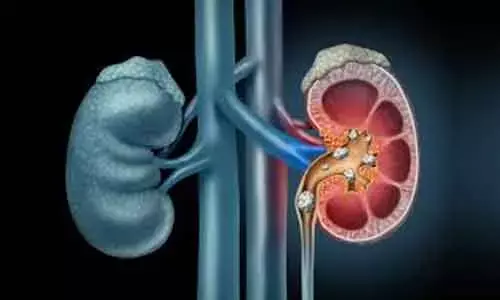- Home
- Medical news & Guidelines
- Anesthesiology
- Cardiology and CTVS
- Critical Care
- Dentistry
- Dermatology
- Diabetes and Endocrinology
- ENT
- Gastroenterology
- Medicine
- Nephrology
- Neurology
- Obstretics-Gynaecology
- Oncology
- Ophthalmology
- Orthopaedics
- Pediatrics-Neonatology
- Psychiatry
- Pulmonology
- Radiology
- Surgery
- Urology
- Laboratory Medicine
- Diet
- Nursing
- Paramedical
- Physiotherapy
- Health news
- Fact Check
- Bone Health Fact Check
- Brain Health Fact Check
- Cancer Related Fact Check
- Child Care Fact Check
- Dental and oral health fact check
- Diabetes and metabolic health fact check
- Diet and Nutrition Fact Check
- Eye and ENT Care Fact Check
- Fitness fact check
- Gut health fact check
- Heart health fact check
- Kidney health fact check
- Medical education fact check
- Men's health fact check
- Respiratory fact check
- Skin and hair care fact check
- Vaccine and Immunization fact check
- Women's health fact check
- AYUSH
- State News
- Andaman and Nicobar Islands
- Andhra Pradesh
- Arunachal Pradesh
- Assam
- Bihar
- Chandigarh
- Chattisgarh
- Dadra and Nagar Haveli
- Daman and Diu
- Delhi
- Goa
- Gujarat
- Haryana
- Himachal Pradesh
- Jammu & Kashmir
- Jharkhand
- Karnataka
- Kerala
- Ladakh
- Lakshadweep
- Madhya Pradesh
- Maharashtra
- Manipur
- Meghalaya
- Mizoram
- Nagaland
- Odisha
- Puducherry
- Punjab
- Rajasthan
- Sikkim
- Tamil Nadu
- Telangana
- Tripura
- Uttar Pradesh
- Uttrakhand
- West Bengal
- Medical Education
- Industry
Natural and surgical menopause closely associated with kidney stone development

A recent study published in the Annals of Epidemiology suggest that natural and surgical menopause are associated with kidney stone disease (KSD) in Asian population. However, postmenopausal hormone therapy did not increase the risk of kidney stone disease (KSD).
The relationship between menopause, postmenopausal hormone therapy, and kidney stone disease was unclear, and most previous research has focused on Caucasians. To explore this issue in an Asian population, a cross-sectional study was conducted by the team led by Tsz-Yi Tang using female participants aged 30-70 years from the Taiwan Biobank. The presence of KSD was defined using a self-reported questionnaire, and the participants were divided into premenopausal and postmenopausal groups. The associations among menopause, postmenopausal hormone therapy, and KSD were examined using binary logistic regression models.
The key highlights of the study were:
A total of 17,460 women were enrolled, with 5976 in the premenopausal group and 11,484 in the postmenopausal group.
The prevalence of KSD was significantly higher in the postmenopausal group than in the premenopausal group (6% vs. 3%).
After adjusting for confounders, the odds ratio for KSD was higher in the postmenopausal group than in the premenopausal group (odds ratio = 1.50; 95% confidence interval = 1.17–1.92).
Both types of menopause (natural and surgical) were associated with KSD in age-adjusted and multivariable models. However, there was no association between postmenopausal hormone therapy and KSD in postmenopausal women who had received it.
The study's limitations include the use of self-reported data, which may not be accurate, and the cross-sectional design, which limits the ability to establish causal relationships. Further research is needed to confirm the findings and explore the underlying mechanisms.
Source:
Tang, T.-Y., Lee, J.-I., Shen, J.-T., Lee, Y.-C., Wang, H.-S., Tsao, Y.-H., Wu, Y.-H., Huang, S.-P., Chen, S.-C., Jhan, J.-H., & Geng, J.-H. (2023). The association between menopause, postmenopausal hormone therapy, and kidney stone disease in Taiwanese women. In Annals of Epidemiology (Vol. 78, pp. 13–18). Elsevier BV. https://doi.org/10.1016/j.annepidem.2022.12.002
Neuroscience Masters graduate
Jacinthlyn Sylvia, a Neuroscience Master's graduate from Chennai has worked extensively in deciphering the neurobiology of cognition and motor control in aging. She also has spread-out exposure to Neurosurgery from her Bachelor’s. She is currently involved in active Neuro-Oncology research. She is an upcoming neuroscientist with a fiery passion for writing. Her news cover at Medical Dialogues feature recent discoveries and updates from the healthcare and biomedical research fields. She can be reached at editorial@medicaldialogues.in
Dr Kamal Kant Kohli-MBBS, DTCD- a chest specialist with more than 30 years of practice and a flair for writing clinical articles, Dr Kamal Kant Kohli joined Medical Dialogues as a Chief Editor of Medical News. Besides writing articles, as an editor, he proofreads and verifies all the medical content published on Medical Dialogues including those coming from journals, studies,medical conferences,guidelines etc. Email: drkohli@medicaldialogues.in. Contact no. 011-43720751


